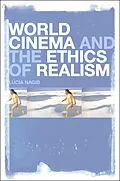World Cinema and the Ethics of Realism is a highly original study. Traditional views of cinematic realism usually draw on the so-called classical cinema and its allegiance to narrative mimesis, but Nagib challenges this, drawing instead on the filmmaker's commitment to truth and to the film medium's material bond with the real.
Starting from the premise that world cinema's creative peaks are governed by an ethics of realism, Nagib conducts comparative case studies picked from world new waves, such as the Japanese New Wave, the French nouvelle vague, the Cinema Novo, the New German Cinema, the Russo-Cuban Revolutionary Cinema, the Portuguese self-performing auteur and the Inuit Indigenous Cinema. Drawing upon Badiou and Rancière, World Cinema and the Ethics of Realism revisits and reformulates several fundamental concepts in film studies, such as illusionism, identification, apparatus, alienation effects, presentation and representation. Its groundbreaking scholarship takes film theory in a bold new direction.
Autorentext
Lúcia Nagib is Professor of Film and Director of the Centre for Film Aesthetics and Cultures (CFAC) at the University of Reading. Her research has focused, among other subjects, on polycentric approaches to world cinema, new waves and new cinemas, cinematic realism and intermediality. She is the author of World Cinema and the Ethics of Realism (Continuum, 2011), Brazil on Screen: Cinema Novo, New Cinema, Utopia (I.B. Tauris, 2007), The Brazilian Film Revival: Interviews with 90 Filmmakers of the 90s (Editora 34, 2002), Born of the Ashes: The Auteur and the Individual in Oshima's Films (Edusp, 1995), Around the Japanese Nouvelle Vague (Editora da Unicamp, 1993) and Werner Herzog: Film as Reality (EstaçãoLiberdade, 1991). She is the editor of Impure Cinema: Intermedial and Intercultural Approaches to Film (with Anne Jerslev, 2013), Theorizing World Cinema (with Chris Perriam and Rajinder Dudrah, I.B. Tauris, 2011), Realism and the Audiovisual Media (with Cecília Mello, Palgrave, 2009), The New Brazilian Cinema (I.B. Tauris, 2003), Master Mizoguchi (Navegar, 1990) and Ozu (Marco Zero, 1990).
Inhalt
List of Illustrations
Acknowledgements
Introduction
Part I - Physical Cinema
Chapter 1. The End of the Other
Physical Realism
The Missing Other
Atanarjuat, the Fast Runner
Yaaba
God and the Devil in the Land of the Sun (Black God, White Devil)
The 400 Blows
Chapter 2. The Immaterial Difference: Werner Herzog Revisited
The Excessive Body
Literal Difference
Physical Difference
Representational Difference
Part II - The Reality of the Medium
Chapter 3. Conceptual Realism in Land in Trance and I Am Cuba
Allegorical Real
Reality as Process: Trance in Land in Trance
Trance, Sexuality and the Christian Myth in I Am Cuba
Mimesis of the Principle
Concluding Remarks
Chapter 4. The Work of Art in Progress: An Analysis of Delicate Crime
Part III - The Ethics of Desire
Chapter 5. The Realm of the Senses, the Ethical Imperative and the Politics of Pleasure
Originality, Beauty and the Porn Genre
The Eroticized Nation
Sex in Red and White: Double Suicide
Anti-Realism and Artistic Real
The Participative Voyeur and the Eroticized Apparatus
Part IV - The Production of Reality
Chapter 6. Hara and Kobayashi's 'Private Documentaries'
Historical Time
Phenomenological Time
Active Subjects
Chapter 7. The Self-Performing Auteur: Ethics in Joao Cesar Monteiro
Ethics of the Impossible Real
God's Autobiography
The History Man
Bibliography
Notes
Index
